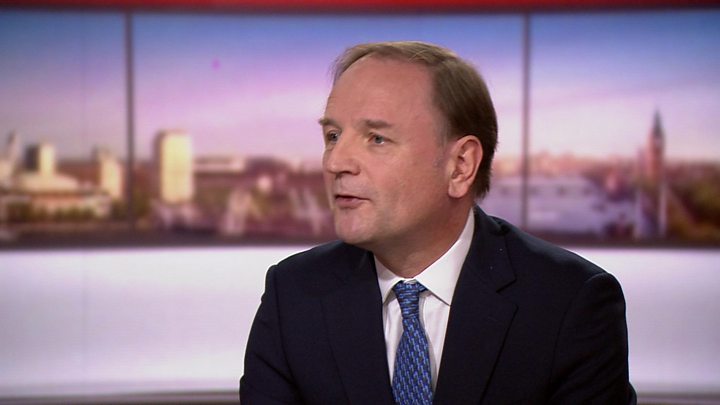
Media playback is unsupported on your device
Plans to adequately fund the social care sector need to be in place within a year, the head of NHS England has said.
Sir Simon Stevens told the BBC the Covid-19 crisis had shone a "very harsh spotlight" on the "resilience" of the care system.
He said there was a need to "decisively answer" how high quality care could be provided long-term.
The Department of Health said it would bring forward a plan for reform.
In their 2019 election manifesto, the Conservatives pledged to find a cross-party solution to reduce pressures on the sector and provide long-term funding.
Speaking on the BBC's Andrew Marr programme, Sir Simon said the Covid-19 pandemic should be used to give momentum to plans to overhaul how the system works.
"If any good is to come from this, we must use this as a moment to resolve once and for all to actually properly resource and reform the way in which social care works in this country," he said.
"The reality is that after at least two decades of talking about it, we do not have a fair and properly resourced adult social care system with a proper set of workforce supports."
Covid-19 'legacy'
He added: "I would hope by the time we are sitting down this time next year on the 73rd birthday of the NHS that we have actually, as a country, been able to decisively answer the question of how are we going to fund and provide high-quality social care for my parents' generation.
"If you take back the history coming out of the Second World War, the country at that point was on austerity. We had rationing for bread and potatoes.
"The founders of the NHS did not use that as a moment to hesitate, they said, 'let one of the legacies of the war be the creation of the NHS'.
"That's the same legacy we need for long term care support in social care coming out of coronavirus."
Image copyright PA Media Image caption The coronavirus crisis has placed many care homes under additional stress.Shadow chancellor Anneliese Dodds told Andrew Marr the government needed to take "much, much more responsibility" for the social care sector.
Asked whether Labour would nationalise private care providers, she said the party was not advocating a "massive grand scheme right at this moment".
But she added: "We do need a new approach to social care into the future, even the government has said that they want that".
'Complex questions'
A Department of Health and Social Care spokesperson said it had set out a "comprehensive action plan" to support social care in England during the pandemic.
"We know there's a need for a long-term solution for social care and there are complex questions to address," they added.
"We will bring forward a plan that puts social care on a sustainable footing to ensure the reforms will last long into the future."
Social care costs
Unlike health care, social care is not generally provided for free. In England, anyone with assets over £23,250 is expected to pay for costs.
Local authorities determine their own means-tests for those receiving care at home, which have to be as generous as the test for care homes.
Free personal care is available in Scotland. Some care costs are capped in Wales, and home care is free for the over-75s in Northern Ireland.
At December's election, the government pledged an extra £1bn per year for social care in England over the next five years.
It has subsequently given an extra £3.2bn in emergency Covid-19 funds to English councils, which can be put towards helping with social care costs.
Ministers have also promised an additional £600m for care homes to help with controlling infections.

 5 years ago
689
5 years ago
689 

